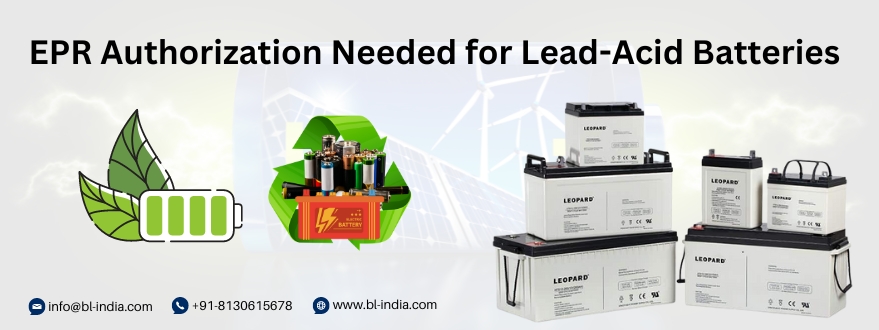
Lead-acid batteries have historically served as the backbone of electrical energy storage, being utilized across various sectors such as automotive, backup power systems, and renewable energy storage. These batteries consist of lead electrodes immersed in a sulfuric acid electrolyte, providing reliable power for various purposes.
However, the disposal and recycling of lead-acid batteries pose significant environmental challenges due to the presence of toxic materials.
In light of these concerns, regulatory frameworks such as Extended Producer Responsibility have emerged to ensure that manufacturers take responsibility for the entire life cycle of their products, including post-consumer waste management.
In this blog, we will explore why EPR Authorization for lead-acid batteries is essential for their manufacturers in India and how they can navigate the process.
Extended Producer Responsibility (EPR) is a regulatory framework aimed at holding manufacturers and importers accountable for the entire life cycle of their products, including post-consumer waste management. Under battery waste management, EPR entails manufacturers and importers taking responsibility for the collection, recycling, and safe disposal of used or end-of-life batteries, as well as their components.
The Ministry of Environment, Forestry, and Climate Change introduced the Battery Waste Management Rules in 2022 under the Environment (Protection) Act, 1986, replacing the previous Battery (Management and Handling) Rules, 2001. These rules provide a comprehensive framework for managing various types of waste batteries, including used or end-of-life batteries, batteries diverted during the manufacturing process, and discarded batteries.
These rules cover all categories of batteries, such as electric vehicle batteries, portable batteries, automotive batteries, and industrial batteries. The primary objective of these rules is to ensure environmentally sound management practices for battery waste and to minimize its impact on human health and the environment.
Under the Battery Waste Management Rules, producers of batteries, including manufacturers, importers, and brand owners, are designated as primary stakeholders and are subject to EPR obligations. This means that they are responsible for collecting and recycling/refurbishing targeted quantities of waste batteries. The rules mandate the registration of producers on a centralized online portal developed by the Central Pollution Control Board (CPCB) and prohibit the disposal of waste batteries in landfills or through incineration.
The Battery Waste Management Rules of 2022 have broad applicability, covering all stakeholders involved in the collection, segregation, reprocessing, transportation, and recycling of waste batteries. This includes producers, manufacturers, traders, dealers, consumers, assemblers, and other establishments engaged in battery-related activities.
Central to these rules is the concept of Extended Producer Responsibility, which places significant responsibility on producers, including importers, for the proper management of waste products. EPR Authorization for battery waste management mandates that producers and importers take responsibility for refurbishing, recycling, and collecting waste batteries, ensuring their environmentally sound disposal and minimizing their impact on human health and the environment.
Under the Battery Waste Management Rules of 2022, Extended Producer Responsibility entails several key responsibilities:
In cases where producers fail to meet their obligations and EPR targets, environmental compensation may be imposed. This aligns with the Polluter Pay Principle, ensuring that those responsible for environmental harm bear the cost of mitigation and remediation efforts. These measures collectively aim to enhance the efficiency and effectiveness of battery waste management while promoting environmental sustainability and responsible producer behaviour.
All manufacturers and importers of lead-acid batteries in India require EPR Authorization due to several compelling reasons:
The eligibility criteria for applying for a lead-acid battery import license include:
Importers should also adhere to some other conditions before planning the transboundary movement of lead-acid batteries:
To renew the EPR certificate for lead-acid batteries, the applicant must follow the prescribed procedure outlined by the regulatory authorities:
Renewed licenses issued upon successful renewal will be valid for one year from the date of issuance, and once the renewal time limit has expired, the applicant will not be able to recover it. Therefore, it's essential to adhere to the renewal timeline to maintain compliance with regulatory requirements and avoid disruptions in operations.
To obtain an EPR certificate for lead-acid batteries, several documents need to be submitted along with the application. These documents include:
Manufacturers looking to obtain the EPR certificate for lead-acid batteries can follow these steps:
Step 1: Gather all necessary documents, including business registration documents, manufacturing licenses, environmental clearances, and any other relevant certificates or permits.
Step 2: Ensure that the manufacturing facility has adequate infrastructure for the collection, recycling, and safe disposal of lead-acid battery waste, as mandated by EPR regulations.
Step 3: Complete the application form for the certificate, providing accurate information about the manufacturing facility, production capacity, waste management infrastructure, and other relevant details.
Step 4: Pay the prescribed application fees as specified by the regulatory authorities for processing the certificate application.
Step 5: Attach all required documents to the application form, including proof of infrastructure facilities, environmental clearances, and any other supporting documentation.
Step 6: The regulatory authorities will review the application and conduct an inspection of the manufacturing facility to verify compliance with EPR requirements.
Step 7: Ensure that the manufacturing facility meets all compliance criteria, including waste management practices, environmental standards, and safety regulations.
Step 8: Upon successful completion of the application review process and verification of compliance, the regulatory authorities will issue the EPR certificate for lead-acid batteries to the manufacturer.
EPR authorization is essential for ensuring compliance with environmental regulations, demonstrating a commitment to responsible waste management practices, and mitigating legal and reputational risks.
For manufacturers operating in India, navigating the complex process of obtaining an EPR certificate for lead-acid batteries can be daunting. That's where Brand Liaison steps in.
Our company specializes in providing assistance and support to manufacturers, streamlining the process of obtaining EPR certification quickly and efficiently. By leveraging our expertise and industry knowledge, manufacturers can expedite the certification process, minimize administrative burdens, and focus on their core business activities.